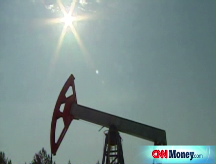Oil up on expected drop in gas supply
Crude prices reversed course as dollar weakens, supply worries surface, and analysts predict a 3 million barrel draw in gasoline supplies.

NEW YORK (CNNMoney.com) -- Oil prices bounced back Tuesday as the dollar weakened and investors worried that a predicted fall in gasoline supplies could cause refineries to step up crude use.
U.S. crude for September delivery rose $1.66 a barrel to settle at $114.53. Prices were volatile during the day, falling below $112 in the morning, then topping $116 in the afternoon before falling back a bit.
Crude jumped after an estimate from Platts, the energy research arm of McGraw-Hill Cos., predicted a 3 million barrel decline in gasoline stocks for last week and an increase in refinery utilization of 0.4%.
A rise in refinery production would drive up demand for raw crude oil.
A decline in gasoline stocks would indicate that refiners had cut production too much, according to Brian Hicks, fund manager at U.S. Global Investors in San Antonio, Texas.
"We've seen refineries pull back because refining hasn't been profitable," said Hicks.
The Energy Department is scheduled to release its official report Wednesday at 10:35 a.m. ET.
Dollar: Oil was also pushed higher as weaker U.S. economic reports drove the dollar down against the 15-nation euro and the Japanese yen.
In the United States, the world's largest oil consumer, wholesale prices rose to the highest annual rate in 27 years, according to a report from the Labor Department.
A second report from the Census Bureau showed that housing starts fell sharply in July to a 17-month low.
"The economic news that continues to come in is all pretty gloomy out there," said Steve Brassey, senior broker with Sonic Futures in San Jose, Calif.
Oil contracts are traded in dollars, and a lower dollar makes them more affordable for foreign investors.
Over the past several weeks, worries about inflation and the U.S. economy have investors concerned that consumers will use less petroleum-derived fuel and begin to permanently shift their spending habits.
Georgian conflict: Concerns about supply disruption in Georgia, a vital pipeline link between Europe and Asia, grew after NATO Secretary-General Jaap de Hoop Scheffer said Russian troops in Georgia were not following a cease-fire agreement brokered Monday.
"If this conflict continues to widen, I don't think the market is going to be able to ignore it anymore," said Phil Flynn, senior market analyst with Alaron Trading in Chicago.
OPEC supply: Also adding to supply concerns were comments by an oil official from Libya, a member of the Organization of Petroleum Exporting Countries, who said that oil prices would probably rebound.
Libya's National Oil Corporation chairman Shokri Ghanem also said the oil cartel was not likely to change production levels when it meets next month, according to a news report.
The end?: Worries about demand have driven oil prices down from a record high of $147.27, reached on July 11.
But some analysts believe crude's sharp slide may be nearing an end.
Oil prices may bottom out between $110 and $112 a barrel, according to James Cordier, founder of commodities brokerage OptionSellers.com in Tampa, Fla.
Geopolitical jitters, which were responsible for much of oil's record rise over the past several months, remain a concern, he said. "I don't think we've seen the last of Iran and Israel," said Cordier. ![]()






